AWM41 1042 - [Nurses Narratives] Sister Leila Smith
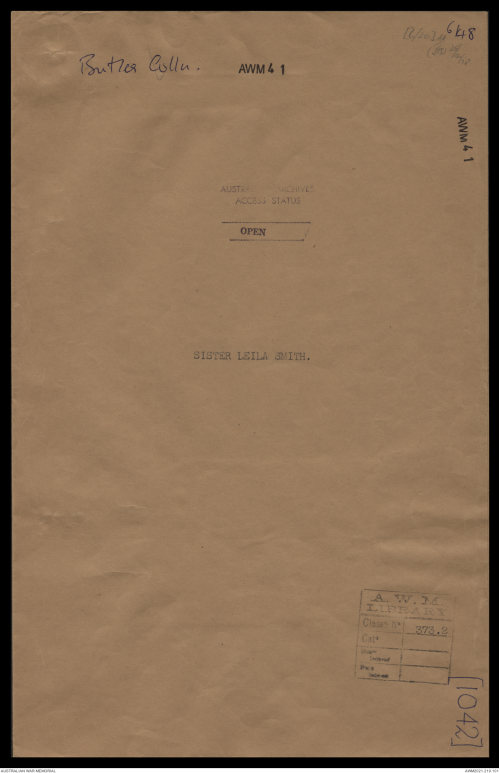
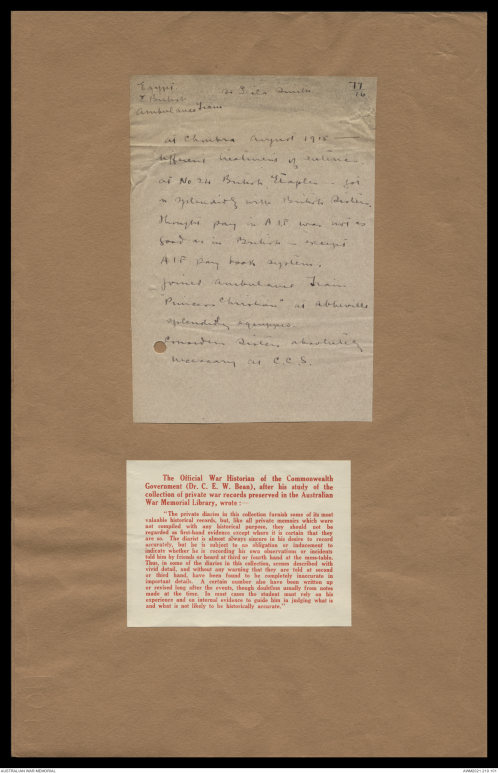
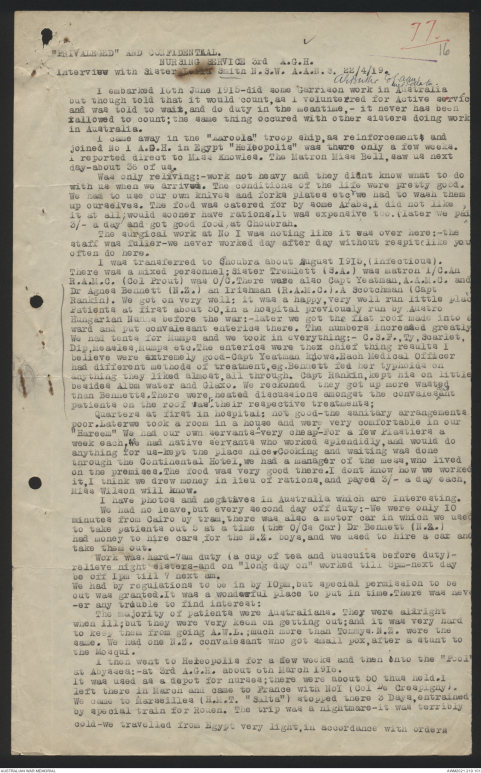
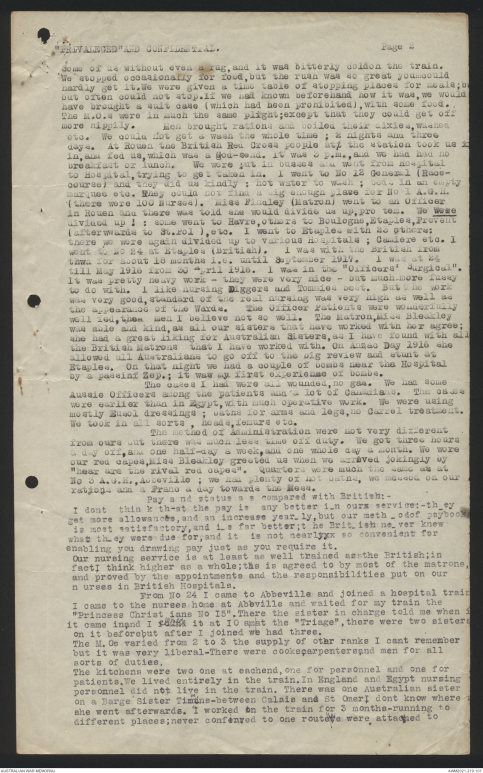
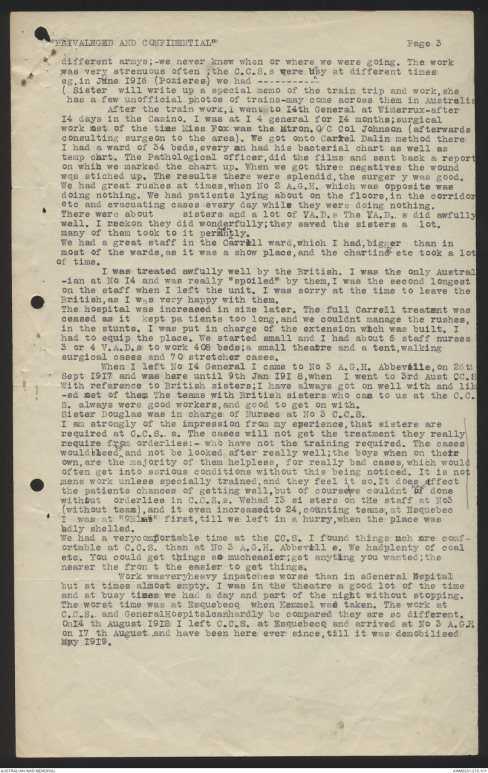
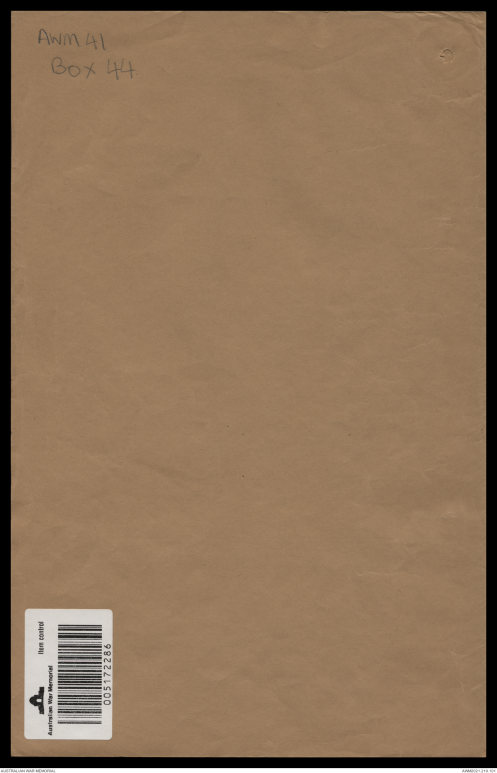
648
Butler Collin. AWM41
AWM41
AUSTRALIAN ARCHIVES
ACCESS STATUS
OPEN
SISTER LEILA SMITH.
A.W.M.
LIBRARY
Classn 373.2
Catd
Illuns
Indexed
Maps
Indexed
[1042]
Egypt
& Sister Smith 77/16
&
At August 1915 -
Different of
at No 24 British Etaples - got
with British Sisters
through pay in A.I.F. was not as
good as in British - except
A I F pay book system.
Joined Ambulance Train
"Princess Christian" at Abbeville
Sisters
necessary at C.C.S.
The Official War Histories of the Commonwealth
Government (Dr. C. E. W. Bean), after his study of the
collection of private war records preserved in the Australian
War Memorial Library, wrote :-
"The private diaries in this collection furnish some of its most
valuable historical records, but like all private memoirs which were
not compiled with any historical purpose, they should not be
regarded as first-hand evidence except where it is certain that they
are so. The diarist is almost always sincere in his desire to record
accurately, but he is subject to no obligation or inducement to
indicate whether he is recording his own observation or incidents
told him by friends or heard at third or fourth hand heard at the mess-table.
Thus, in some of the diaries in this collection, scenes described with
vivid detail, and without any warning that they are told at second
or third hand have been found to be completely inaccurate in
important details. A certain number have been written up
or reviewed long after the events, though doubtless usually from notes
made at the time. In most cases the student must rely on his
experience and on internal evidence to guide him in judging what is
and what is not likely to be historically accurate."
[*77/16*]
"PRIVALEGED" AND CONFIDENTIAL.
NURSING SERVICE 3rd A.G.H.
Interview with Sister Leila Smith N.S.W. A.A.N.S. 22/4/19.
[*?*]
I embarked 10th June 1915-did some Garrison work in Australia
but though told that it would count, as I volunterred for Active service
and was told to wait, and do duty in the meantime,- it never has beenfallowed to count ;the same thing occured with other sisters doing work
in Australia.
I came away in the "Karoola" troop ship,as reinforcements and
joined No 1 A.G.H. in Egypt "Heliopolis" was there only a few weeks.
I reported direct to Miss Knowles. The Matron Miss Bell, saw us next
day-about 36 of us.
Was only relieving:-work not heavy and they didnt know what to do
with us when we arrived. The conditions of the life were pretty good.
We had to use our own knives and forks plates etc ^& we had to wash them
up ourselves. The food was catered for by some Arabs.I did not like
it at all;would sooner have rations.It was expensive too.(later we pa^id
3/- a day and got good food at Choubrah.
The surgical work at No 1 was noting like it was over here:-the
staff was fuller-we never worked day after day without respite like you
often do here.
I was transferred to SChoubra about NAugust 1915,(infectious).
There was a mixed personnel:Sister Tremlett (S.A.) was Matron I/C.An
R.A.M.C. (Col Prout) was O/C.There were also Capt. Yeatman, A.A.M.C. and
Dr Agnes Bennett (N.Z.) an Irishman (R.A.M.C.).A Scotchman (Capt.
Rankin). We got on very well; it was a happy,very well run little plac
Patients at first about 50,in a hospital previously run by Austro
Hungarian Nunns before the war:-later we got the flat roof made into a
ward and put convalescent enterics there. The numbers increased greatly
We had tents for Mumps and we took in everything:- C.S.F.,Ty, Scarlet,
Dip,Measles,Mumps etc.The enterics were thex chief thing results I
believe were extremely good-Capt Yeatman knows.Each Medical Officer
had different methods of treatment,eg.Bennett fed her typhoids on
anything they liked almost,all through. Capt Rankin,kept his on little
beside Alum water and Glaxo. We reckoned they got up more wasted
than Bennett.There were heated discussions amongst the convales^cent
patients on the roof xas ^to their respective treatments.
Quarters at first in hospital: not good-the sanitary arrangements
poor.Laterwe took a room in a house and were very comfortable in aur
"Hareem" We had our own servants-very cheap-for a few Piastiers a
week each.We had native servants who worked splendidly ,and would do
anything for us-kept the place nice.Cooking and waiting was done
through the Continental Hotel, we had a manager of the mess, who lived
on the premises.The food was very good there.I dont know how we worked
it,I think we drew money in lieu of rations, and payed 3/- a day each,
Miss Wilson will know.
I have photos and negatives in Australia which are interesting.
We had no leave,but every second day off duty:-We were only 10
minutes from Cairo by tram,there was also a motor car in which we used
to take patients out 5 at a time (the O/Cs Car) Dr Bennett (N.Z.)
had money to hire cars for the N.Z. boys,and we used to hire a car
and take them out.
Work was hard-7am duty (a cup of tea and buscuits before duty)-
relieve night sisters-and on "long day on" worked till 8pm-next day
be off 1pm till 7 next am.
We had by regulation to be in by 10pm,but special permission to be
out was granted.It was a wonderful place to put in time.There was never
any trouble to find interest:
The majority of patients were Australians. They were alxright
when ill;but they were very keen on getting out;and it was very hard
to keep them from going A.W.L.;much more time than Tommys,N.Z. were the
same. We had one N.Z. convalescent who got small pox,after a stunt to
the Mosqui.
I then went to Heliopolis for a few weeks and then into the "Pool"
at [[Abyasea?]]:-3rd A.G.H. about 6th March 1916.
It was used as a depot for nurses;there were about 50 thus held.I
left there in March and came to France with No1 (Col De Crepigny).
We came to Marseilles (H.M.T. "Salta") stopped there 3 Days,entrained
by special train to Rouen. The trip was a nightmare-it was terribly
cold-we travelled from Egypt very light,in accordance with orders
"PRIVALEGED" AND CONFIDENTIAL. Page 2
Some of use without even a rug, and it was bitterly cold on the train.
We stopped occasionally for food, but the rush was so great you could
hardly get it.We were given a time table of stopping places for meals ;b
but could not stop.If we had known beforehand how it was, we would
have brought a suit case (which had been prohibited),with some food.
The M.O.s were in much the same plight; except that they could get off
more nippily. Men brought rations and boiled their dixies washer
etc. We could not get a wash the whole time ; 2 nights and three
days. At Rouen the British Red Cross people atx the station took us x
in, and fed us ,which was a God-send. It was 3 p.m.,and we had had no
breakfast or lunch. We were put in buses and went from Hospital
to Hospital,trying to get taken in, I went to No 12 General (Racecourse)
and they did us kindly : hot water to wash ; beds in an empty
marquee etc. They could not find a big enough place for No 1 A.G.H.
(there were 100 nurses). Miss Finuley (Matron) went to an Officer
in Rouen and there was told she would divide us up, pro tom. We were
divided up ! : some went to Havre,others to Boulogne,Etaples,Provent
(afterwards to St.Pol),etc. I went to Etaples with 23 others;
where we were again divided up to various Hospitals ; Camiere etc. I
went to No 24 at Etaples (British). I was with the British from
then for about 18 months i.e. until September 1917. I was at 24
till May 1916 from 30 April 1916. I was in the "Officers' Surgical".
It was pretty heavy work - they were very nice - but much more fussy
to do with. I like nursing Diggers and Tommies best. But the work
was very good,standard of the real nursing was very high as well as
the appearance of the Wards. The Officer Patients were wonderfully
well fed,then men I believe not so well. The Matron,Miss Bleakley
was able and kind, as all our sisters that have worked with her agree;
she had a great liking for Australian Sisters, as I have found with all
the British Matrons that I have worked with. On Anzac Day 1916 she
allowed all Australians to go off to the big review and stunt at
Etaples. On that night we had a couple of bombs near the Hospital
by a passinf Zep.; it was my first experience of bombs.
The cases I had were all wounded, no gas. We had some
Aussie Officers among the patients and a lot of Canadians. The cases
were earlier than in Egypt,with much operative work. We were using
mostly Eusol dressings ; [[catns??]] for arms and legs, no Carrol treatment.
We took it all sorts , heads,femurs etc.
The method of Administration were not very different
from ours out there was much less time off duty. We got three hours
a day off,and one half-day a week,and one whole day a month. We wore
our red capes,Miss Bleakley greeted us when we arrived jokingly by
“hear are the rival red capes”. Quarters were much the same as at
No 3 A.G.H., Abbeville ; we had plenty of hot baths. We messed on our
rations and a Franc a day towards the Mess.
Pay and status as compared with British:-
I dont thin k th-at the pay is any better i_n ourx service:-th-ey
get more allowances, and an increase year_ly but our meth _ odof paybook
is most satisfactory,and i_s far better;t he Brit_ish ne_ver knew
what th_ey were due for,and it is not nearlyxx so convenient for
enabling you drawing pay just as you require it.
Our nursing service is at least as well trained as the British;in
factI think higher as a whole;ths is agreed to by most of the matrons,
and proved by the appointments and the responsibilities put on our
n urses in British Hospitals
From No 24. I came to Abbeville and joined a hospital train.
I came to the nurses home at Abbville and waited for my train the
Princess Christ ians No 15. There the sister in charge told me when i
it came in,and I [[call?]] it nt 10 sm|at the “Triage” , there were two sisters
on it beforebut after I joined we had three
The M.Os varied from 2 to 3 the supply of othr ranks I cant remember
but it was very liberal-There were cooks,carpenters,and men for all
sorts of duties
The kitchens were two one at each end, one for personnel and one for
patients.We lived entirely in the train. In England and Egypt nursing
personnel did not live in the train. There was one Australian sister
on a Barge Sister Tim^mins-between Calais and St OmerI don’t know where
she went afterwards. I worked on the train for 3 months-running to
different places;never confinxed to one routeWe were attached to
"PRIVILAGED AND CONFIDENTIAL" Page 3
different armies:- we never knew when or where we were going. The work
was very strenuous often ;the C.C.S.s were b^usy at different times
eg in June 1916 (Pozieres) we had -----------
( Sister will write up a special memo of the train trip and work, she
has a few unofficial photos of trains-may come across them in Australia
After the train work, I went to the 14th General at Wimerrux-after
14 days in the Casino. I was at 1 4 general for 14 months;surgical
work xst of the time Miss Fox was the Mtron. C/C Col Johnson (afterwards
consulting surgeon to the area). We got onto Carrel Dalin method there
I had a ward of 34 beds, every an had his bacterial chart as well as
temp chart. The Pathological officer, did the films and sent back a report
on whih we marked the chart up. When we got three negatives the wound
was stitched up. The results there were splendid, the surger y was good.
We had great rushes at times, when No 2 A.G.H. which was opposite was
doing nothing. We had patients lying about on the floors, in the corridor
etc and evacuating cases every day while they were doing nothing.
There were about sisters and a lot of VA.D.s The VA.D. a did awfully
well. I reckon they did wonderfully:they saved the sisters a lot.
many of them took to it perm^anently.
We had a great staff in the Carrell Ward,which I had, bigger than in
most of the wards, as it was a show place, and the charting etc took a lot
of time.
I was treated awfully well by the British. I was the only Australian
at No 14 and was really “spoiled” by them, I was the second longest
on the staff when I left the unit. I was sorry at the time to leave the
British, as I was very happy with them.
The hospital was increased in size later. The full Carrell treatment was
ceased as it kept pa tients too long, and we couldnt manage the rushes,
in the stunts. I was put in charge of the extension which was built. I
had to equip the place. We started small and I had about 6 staff nurses
3 or 4 V.A.D.s to work 408 beds;a small theatre and a tent , walking
surgical cases and 70 stretcher cases.
When I left No 14 General I came to the No 3 A.G.H. Abbeville on 26th
Sept 1917 and was here until 9th Jan 191 8, when I went to 3rd Aust C.C.S
With reference to British sisters;I have always got on well with and liked
ost of them. The teams with British sisters who cam to us at the C.C.
S. always were good workers, and good to get on with.
Sister Douglas was in charge of Nurses at No 3 C.C.S.
I am strongly of the impression from my experience, that sisters are
required at C.C.S. s. The cases will not get the treatment they really
require from orderlies:- who have not the training required. The cases
would bleed and not be looked after really well;the boys went on their
own, are the majority of them helpless, for really bad cases which would
often get into serious conditions without this being noticed. It is not
mens work unless specifically trained, and they feel it so. It does affect
the patients chances of getting well, but of course\we couldnt ^have done
without orderlies in the C.C.S. s. Wehad 13 si sters on the staff at No3
(without team), and it even increased to 24, counting teams, at Requebec
I was at [[9Exxx??]] first, till we left in a hurry, when the place was
bdly shelled.
We had a very comfortable time at the CC.S. I found things much more comfortable at C.C.S. than at No 3 A.G.H. Abbeville. We had plenty of coal
etc. You could get things so much easier; get anything you wanted; the
nearer the front the easier to get things.
Work was very heavy in patches worse than in a General Hospital
but at times almost empty. I was in the theatre a good lot of the time
and at busy times we had a day and part of the night without stopping.
The worst time was at Requebecq when Kemmel was taken. The work at
C.C.S. and General Hospital can hardly be compared they are so different.
On14 th August 1918 I left C.C.S. at Requebecq and arrived at No 3 A.G.H.
on 17 th August and have been here ever since ,till it was demobilised
May 1919.
[*AWM41
Box 44*]
Item control
Australian War Memorial
Barcode - see original.
005172286
 Sam scott
Sam scottThis transcription item is now locked to you for editing. To release the lock either Save your changes or Cancel.
This lock will be automatically released after 60 minutes of inactivity.